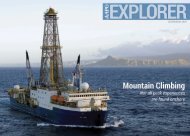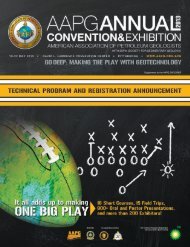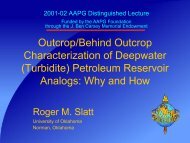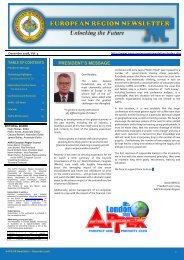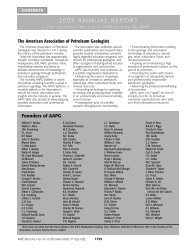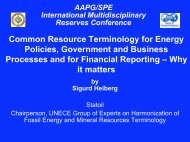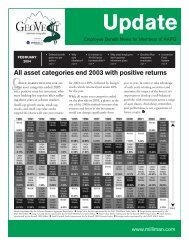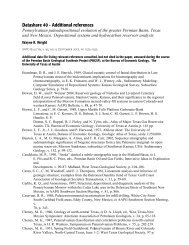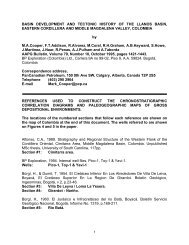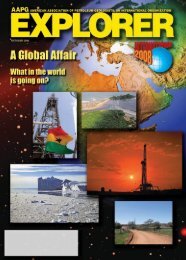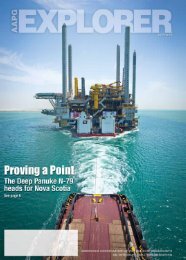Download - American Association of Petroleum Geologists
Download - American Association of Petroleum Geologists
Download - American Association of Petroleum Geologists
You also want an ePaper? Increase the reach of your titles
YUMPU automatically turns print PDFs into web optimized ePapers that Google loves.
Letters to the editor should include your name and address and should be mailed to Readers’<br />
Forum, c/o AAPG EXPLORER, P.O. Box 979, Tulsa, Okla. 74101, or fax (918) 560-2636;<br />
or e-mail to forum@aapg.org. Letters may be edited or held due to space restrictions.<br />
READERS’FORUM<br />
Strategies for Success<br />
Regarding your story on “Strategies for<br />
Success” (April EXPLORER): The article<br />
by Louise Durham has shed light on many<br />
important areas <strong>of</strong> concern that need to be<br />
addressed and dealt with collectively.<br />
Transparency and access to a common<br />
data pool with respect to the challenges<br />
(international or local) and how to deal with<br />
them are the only way for advancing our<br />
unconventional exploration and exploitation<br />
trend – and continue as geoscientists to<br />
play our role in providing energy in an<br />
affordable and safe way.<br />
Let’s remind ourselves <strong>of</strong> the<br />
advancements made through the digital<br />
era back in the 1970s, and the technical<br />
transformation that has followed in 2-D,<br />
3-D, 4-D seismic in securing more energy<br />
resources, without which we could not have<br />
responded efficiently to the population<br />
explosion and energy needs over the years.<br />
Therefore, let us continue our drive and<br />
take advantage <strong>of</strong> the breakthroughs in<br />
communications and the web, and use<br />
them as a means <strong>of</strong> bringing us closer<br />
to being able to respond to the everincreasing<br />
challenges – and change the<br />
“unconventional” to the “conventional” soon.<br />
Abdurrazak Ali Endisha<br />
Cairo, Egypt<br />
Shaking it up<br />
In regard to John Lorenz’ article on<br />
massive stimulation by underground nuclear<br />
explosions (Historical Highlights, March<br />
EXPLORER): There were other studies done<br />
in 1965-1967 on the Nevada Test Site.<br />
I was involved in very detailed geologic<br />
studies to discover the control <strong>of</strong> surface<br />
fracture patterns formed above explosions<br />
that were unrelated to and beyond the<br />
central chimney collapse. These were found<br />
to be attributable to through-going joint<br />
sets related to faults. The explosions jostled<br />
the joint-bounded blocks in the Paleozoic<br />
bedrock causing the fractures to propagate<br />
upward through 2,000 feet <strong>of</strong> alluvium and<br />
reproduce the joint pattern on the surface.<br />
Where the joint pattern changed, the<br />
Safety<br />
from page 34<br />
The difference between the NOV and<br />
a penalty is that the penalty carries a<br />
monetary fine, according to Glosser.<br />
She noted the issuance <strong>of</strong> penalties<br />
declined between 2008 and 2011 during<br />
various drilling stages. Yet non-minor, or<br />
serious, NOVs increased during that time.<br />
“This brings up the idea that maybe the<br />
inspectors are using more discretion over<br />
time,” Glosser said.<br />
“We also see that as Marcellus<br />
exploration has become more popular,<br />
there has been more funding dedicated<br />
to the programs,” she added, “which has<br />
resulted in more inspectors being hired and<br />
more inspections being performed by the<br />
Pennsylvania DEP.”<br />
Self-Reporting<br />
In a recent feature story on drilling<br />
safety in the Marcellus, a leading business/<br />
financial newspaper noted that inspections<br />
<strong>of</strong> Marcellus operations more than doubled<br />
between 2010 and 2012, according<br />
to Pennsylvania DEP data, when the<br />
department doubled its staff <strong>of</strong> inspectors.<br />
Violations dropped about 50 percent during<br />
that time.<br />
At least part <strong>of</strong> this drop was attributed<br />
to larger companies buying out some <strong>of</strong><br />
the small drillers who, though <strong>of</strong>ten skilled<br />
fracture pattern changed. The deeper shots<br />
produced better surface patterns.<br />
Explosions close to the Yucca Fault also<br />
triggered fault <strong>of</strong>fset.<br />
Jostling <strong>of</strong> joint and faults by repeated<br />
earthquakes over long periods <strong>of</strong> time<br />
might explain the many surface lineaments<br />
present in relatively low seismically active<br />
areas such as the eastern United States.<br />
Patrick Barosh<br />
Bristol, R.I.<br />
It Seems Obvious<br />
Planet earth and mankind could not<br />
survive without CO 2. As to climate change,<br />
the climate science community is increasing<br />
its support that “CO 2 is neither a pollutant<br />
nor a driver <strong>of</strong> climate change.”<br />
Those holding an opposite view should<br />
read “Fire, Ice, Paradise,” by H. Leighton<br />
Steward. His views regarding CO 2 enjoy<br />
wide support by many in the climate<br />
science group. Steward suggests we ask<br />
ourselves as we ask others, “Are we willing<br />
to bet our economy, our standard <strong>of</strong> living<br />
and lose our opportunity to provide more<br />
food and shelter for millions <strong>of</strong> people on a<br />
warning <strong>of</strong> catastrophic global warming that<br />
never happened, even when CO 2 levels in<br />
the atmosphere were 18 times higher than<br />
today?”<br />
Further support for Steward’s positions<br />
regarding CO 2 comes from a group <strong>of</strong> more<br />
than 20 scientists and engineers known<br />
as The Right Climate Stuff (a group that<br />
includes AAPG Honorary member and<br />
former NASA astronaut Harrison Schmitt).<br />
It seems clear (also even obvious) that<br />
our politicians and government agencies<br />
should take another look at the real effects<br />
<strong>of</strong> CO 2 on climate before madly rushing into<br />
ill-conceived legislation in the matters <strong>of</strong><br />
carbon tax, etc., and massive continuation<br />
<strong>of</strong> subsidies for alternative fuels, which can<br />
either compete with fossil fuels in cost or<br />
efficiency.<br />
Dick Baile<br />
Houston<br />
at what they do, are not always adequately<br />
financed to implement the somewhat<br />
extreme safety measures needed.<br />
These buyouts are rather typical <strong>of</strong> big<br />
plays, which <strong>of</strong>ten are triggered by smaller<br />
companies. The small entities essentially<br />
pave the way for their well-funded big<br />
brethren to move in and apply the latest and<br />
greatest technical expertise.<br />
For example, when big-major Shell<br />
bought early-Marcellus-driller East<br />
Resources, it reportedly shut in the rigs for a<br />
couple <strong>of</strong> weeks to retrain the workers as a<br />
first step to improvement.<br />
Following the takeover, Shell is reported<br />
to have averaged less than one violation for<br />
every four wells drilled.<br />
DEP data indicate that small private firms<br />
and public companies that tally below $2<br />
billion in stock market value are most <strong>of</strong>ten<br />
the ones cited for infractions.<br />
Glosser noted that drillers <strong>of</strong>ten report<br />
their own incidents, and the DEP will send<br />
someone to inspect.<br />
“When the drillers are self-reporting, the<br />
public complains less,” she emphasized. “In<br />
the years when the public is reporting more<br />
complaints, the drillers are reporting fewer<br />
incidents.”<br />
The benefits <strong>of</strong> understanding the<br />
Marcellus HSE incident reporting include:<br />
u Identification <strong>of</strong> engineering and<br />
operational risks.<br />
u Promotion <strong>of</strong> public confidence in<br />
shale gas development practices.<br />
EXPLORER<br />
AAPG<br />
EXPLORER<br />
WWW.AAPG.ORG MAY 2013<br />
75



